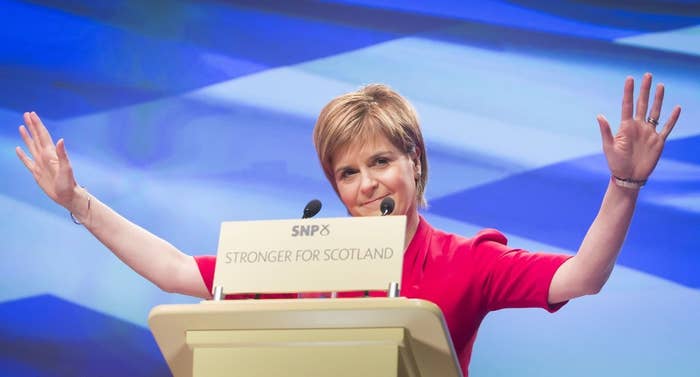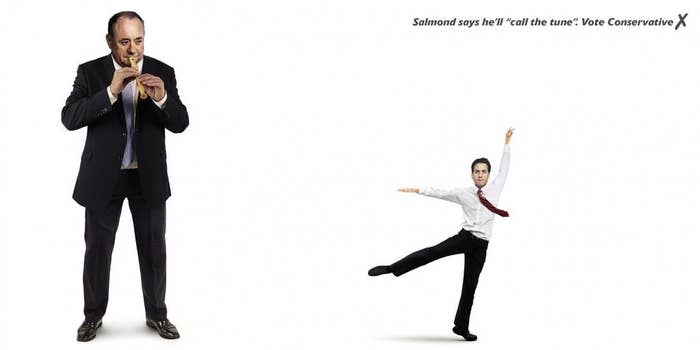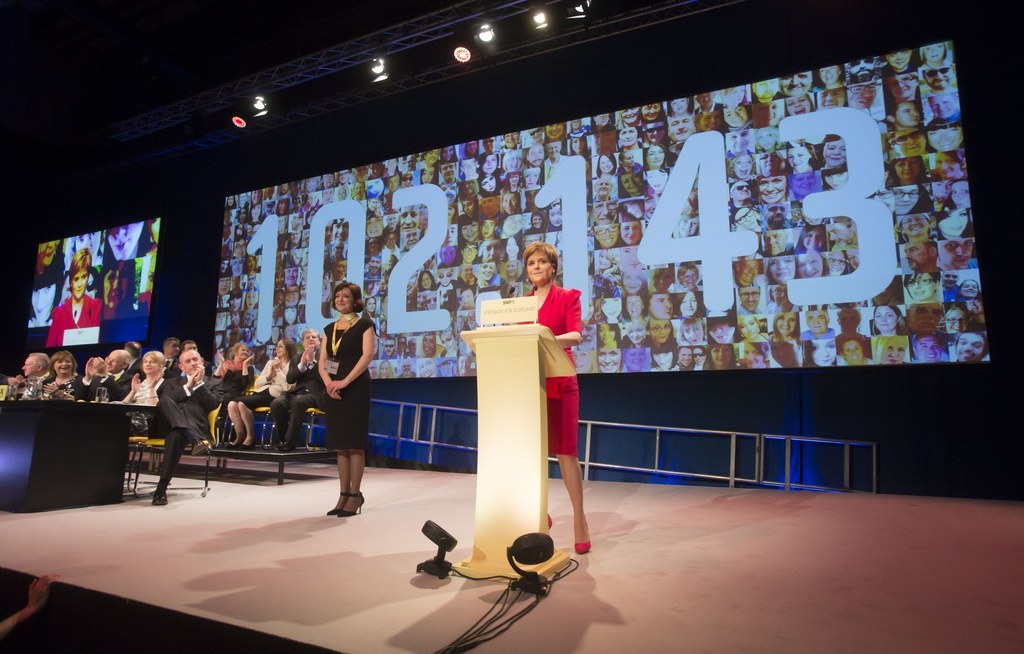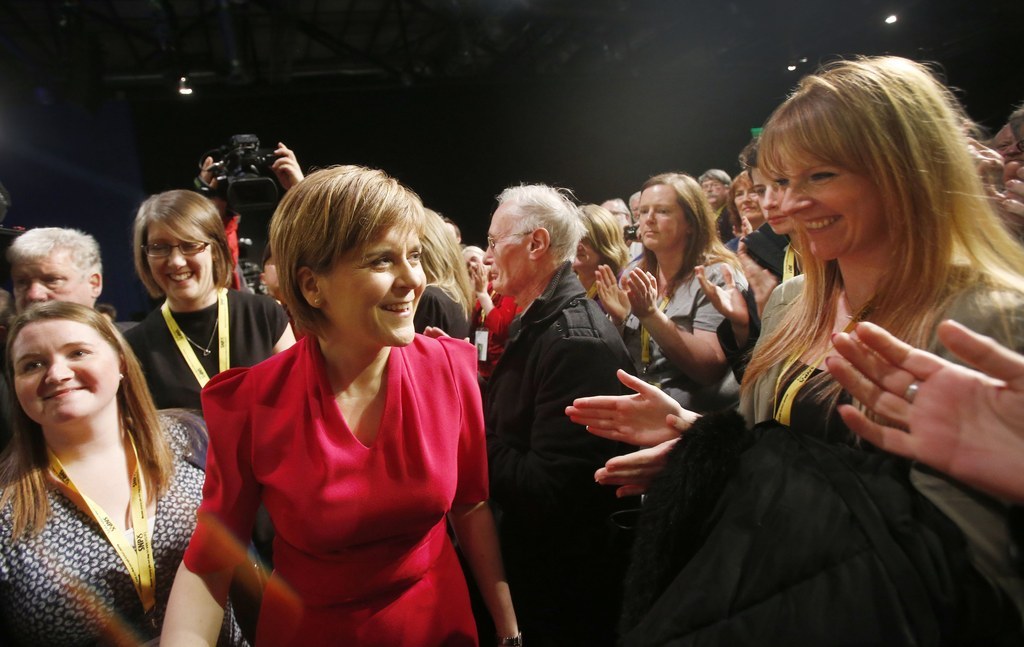
GLASGOW – The SNP expects to have a "very, very significant" role in the next parliament if Ed Miliband is prime minister, according to leader Nicola Sturgeon.
She said her party will "force the direction" of a minority Labour government, and she has made contact with current backbench Labour MPs who have indicated they'll help make the SNP's voice be heard.
In her only non-broadcast interview at the SNP's biggest ever conference in Glasgow, a slightly tired first minister sat down in a hotel lobby with BuzzFeed News early on Sunday morning to explain why she would do everything possible to stop a Conservative government, how she intends to exert control over Labour, and discussed the identity of Alex Salmond's Solero Lady – although she insisted details of the latter remain strictly off the record.
"A party that's not in government in a minority scenario, voting on an issue-by-issue basis, is in a very powerful position," said the first minister. "I know there are Labour MPs who will be very supportive of some of the policy positions we're putting forward, so the influence we have in that scenario is very, very significant."
She explained that there are two options open to her party – a formal agreement which would require Labour to make concessions over key issues such as renewing the Trident nuclear system and austerity, or an informal vote-by-vote arrangement which she said would allow the SNP to exert its new-found influence each time Labour wanted to a vote to pass.
"We can force a direction on them," said Sturgeon. "If we're voting against a minority Labour government on an issue which mattered to us, if we can win enough support from across the House of Commons, including for Labour backbenches, we can have such a significant influence."
This potential influence has been seized upon by the Conservative election campaign, which released an attack advert threatening English voters with the prospect of the SNP "calling the tune" if Ed Miliband becomes prime minister.

However, Sturgeon said she is making an effort to appeal to voters outside Scotland by doing more high-profile UK-wide media appearances, including a series of speeches in London in the run-up to the election campaign. She believes it's paying off.
"There's a lot of people in England who say 'I wish we had SNP candidates where I live' because it would give them a choice they don't really feel they have between the main parties on the ballot paper in England," she said.
"I think the majority of the people in England see the SNP very differently to how the SNP is presented by the media in England, I hope so anyway."
However, the first minister accepts that people in the rest of the UK might be suspicious of her party on the basis that only six months ago, they wanted to break the union apart. The Conservatives are trying to convince voters in England that Sturgeon doesn't care about them – a charge she strongly rejects.
"I think there's a lot of common ground and common cause we can make with other people in other parts of the UK who have as much of a sense of alienation from the Westminster system as we do right now," she said.
"So, I make no bones about trying very hard to say to other people in the rest of the UK, while they might not agree with the SNP on independence or one particular policy, they don't need to see us as people they can't find common ground with."
Sturgeon joins the Greens, UKIP, and Plaid Cymru in taking a "both as bad as each other" approach when talking about Labour and the Conservatives. During the referendum campaign, she accused Labour of being indistinguishable from the Conservatives as part of the Better Together campaign – and she hasn't changed her mind since.
It may seem strange, therefore, that she has vowed to "lock David Cameron out of Downing Street", but is determined to make Ed Miliband – who she says she has only ever met once, at the Commonwealth Games opening ceremony – the UK's new prime minister.
"Scotland has rejected the Tories for my entire lifetime," she explained. "That's not true of Labour, but it may be about to be true, although I'm taking nothing for granted.
"There's just a simple point of principle that the SNP, of all parties, to ever put the Tories putting in power would be unthinkable, even though, in policy terms, I struggle to see the differences between the Tories and Labour.
"The language might be different and the emphasis might be different. Ed Miliband is clearly trying to say there's big differences but if you scratch the surface the substantive positions are not a world apart."

Sturgeon hopes that a Miliband government guided by the SNP will bring about a "more progressive politics", but refuses to be drawn on what would happen if that plan fails.
If the SNP's voice isn't heard within the House of Commons, she doesn't say whether or not the SNP would be willing to hamstring a Labour government by voting against its Budget or Queen's Speech if it didn't suit it. Instead, she expects a minority Labour government would be able to limp along and lose votes without triggering a fresh election.
"I'm not getting into that – there's a limit to how far you should get into the what-ifs in a post-election scenario," she said. "But the Fixed-term Parliaments Act changes the whole scenario – there are very limited circumstances you could have a general election in Westminster before the end of the fixed term.
"Governments in a minority situation, you can lose votes, but you wouldn't necessarily fall as a government."
Sturgeon has been first minister for four months, but the shadow of her predecessor, Alex Salmond, still looms large – especially in the past few weeks, as Salmond has been busy plugging his new referendum diary on every current affairs programme that will have him.
Sturgeon said she still receives advice from Salmond, but added that part of what she's learned from her mentor is that she must be a strong leader in her own right, even while not ignoring his wealth of experience.
"He's always there for advice when I need him – if I need to pick up the phone to him then I know he's there," said Sturgeon. "Alex is a colossus in politics, and the idea that I would somehow stop taking advice from a guy I've taken advice from for 25 years is not going to happen.
"But because of everything he taught me and the experience I was able to learn from him, I'm able to stand on my own two feet as first minister without constantly turning to him for advice."

She said she enjoyed Alex Salmond's referendum diary, adding that she might write her own one day, and when asked for a difference between her and Salmond she said the media treat her differently than Salmond because of her gender.
For example, one recent double-page story in The Sun featured Sturgeon in a tartan bikini swinging from a Miley Cyrus wrecking ball.
"There is a difference, maybe down to the fact he's a man and I'm a woman – the portrayal is different," she said. "I think the portrayal in sections of the media of women in politics is damaging to efforts to encourage more women to come into politics, but that's a general sense, it's not about me particularly."
Sturgeon does all of her own tweeting – "for better or worse" – but tries not to spend too much time on social media.
"I try to keep on top of it but you know what Twitter's like when you have a lot of followers and you follow a lot of people, I'd do nothing else if I kept completely on top of it," she said. "It's a really good medium, but I think the danger of it is to get too dragged into it, that would not be good for my sanity."
Independence is off the agenda for the immediate future, although Sturgeon "makes no secret of the fact" that she wants Scotland to be independent.
A central focus of the party is to gain more powers for Scotland, and in particular gain "full fiscal autonomy", which she said could be be attained without the say of the Scottish people in a referendum.
But her belief in full independence is unshakable, and will always remain her driving force in politics. We asked if there is there any circumstance, economic or otherwise, that would convince her that independence would be a bad idea.
"No," she said, firmly. "All countries have good times and bad times economically, and we'd be no different to that, but you don't hear other countries at time of economic difficulty saying. 'We don't want independence any more.'
"Independence is about trying to chart your own course and being responsible for your own successes and learning from your own failures. It's the intrinsic measures of independence that I think are so important to any country, and any individual."
BONUS: Word Association With Nicola Sturgeon
At the end of the interview, we asked if Nicola Sturgeon would humour us and play a game of word association. After a small amount of protest – "It's too early for this!" – she took part:
David Cameron – "Slightly arrogant"
Ed Miliband – "Slightly weak"
Nick Clegg – "Heading for defeat"
Leanne Wood – "Fantastic"
Natalie Bennett – "Principled"
Nigel Farage – "Unpleasant"
Gordon Brown – "Big figure but had his day"
Alex Salmond – "Friend and mentor"
Ruth Davidson – "Gutsy"
Kezia Dugdale – "Principled, but wrong in her choice of party"
Jim Murphy – "Changing his mind rather a lot"
Glasgow – "Fantastic"
Irn-Bru – "Good in moderation"
Haggis – "Lovely"
Scotland – "Home"
